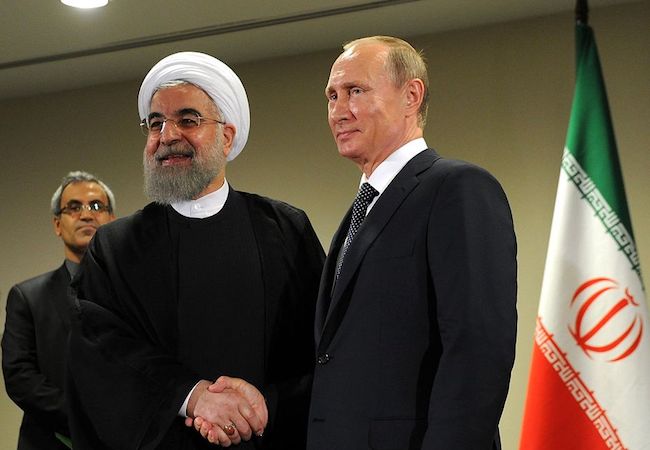Iran-Russia alliance: A balancing behaviour or a bandwagoning conduct

By Rafaa Chehoudi
In an unforseen decision last August, Iran allowed Russian warplanes to conduct several missions over Syria from the Shahid Nojah Air base in Iran. Russian tactical bombers took off from the airbase and targetted several spots related to ISIS and Jabhat Al Nusra. As surprising as it seems, observers and policy makers did not expect such move given the long unstable relationship between Russia and Iran, often associated with tension and uncertainty.
If we carefully examine the history, Iran and Russia have often come up against strained relations, from the then leader Ayatollah persistent criticism of the Marxsist ideology during the cold war, to the unjustified Soviet invasion of Afghanistan right after the Iranian revolution and the ouster of the Shah. If bad history generates unreliable relations, then questioning the nature of today Iran-Russia relations becomes legitimate. Internationally, Washington was even more surprised , but avoided any direct criticism nevertheless. Instead, the Department of State proclaimed that it would ponder over whether Russia has violated a UN Security Council resolution 2231 on military dealings with Tehran.
The aforementioned resolution manages international military interactions between Iran and other international actors. Such interaction includes training, financial assistance and the acquistion of new technologies. While the US administration is turning a blind eye on other forms of violations of the UN resolution, the latter seems over concerned about the Russian-Iranian possible alliance. For instance, Obama administration did not directly criticize Iranian presence in Syria best expressed through sending Revolutionary Guards Corps (IRGC) on Syrian grounds.
Understanding the nature of Iranian-Russian alliance becomes inevitable. Alliances are ususally formed according to two major patterns. First, balancing behaviour is the most classical form of alliances, in which states ally with other individual states to protect themselves from stronger and more powerful sides. The argument that Iran-Russia alliance is the result of balancing behaviour endeavours may be true to some extent. Russia is a key player in the MENA region and it is already forming a significant balance of power against the United States. Russia is a permanent member in the United Nations Security Council and a founding member of the BRICS. Russia is also a significant military power, given its ability to intervene in Ukraine and Syria. Russia is also considered as an economic power . Albeit sanctioned by the West for annexing Crimea, Russia succeeded in implementing effective financial and banking reforms and thus increasing its economic growth from 0.5% to 0.8%. Accordingly, Russia is solely imposing a balance of power and the alliance with Iran would not make sense to reach this end.
Second, alliances may be shaped according to bandwagoning behaviour, by which states join stronger sides in order to avoid potential threat either to protect themselves or to maximize their power. These states usually join newly rising powers out of fear or out of greed. This is applicable to the Iranian-Russian case. Given that economic sanctions on Iran have been lifetd thanks to US-Iran nuclear deal, Iran rejoiced a palpable economic growth from 4.2% to 4.6% in 2016, according to the latest MENA Economic Monitor Report. Politically, Iran is undoubtedly hyper-active in the middle east with a plain military and financial engagement in Iraq, Syria and Yemen. In Syria, the Qods Forces of the Islamic Revolutionary Guard Corps are currently providing siginificant military assistance to Bashar’s regime. King Abdullah of Jordan expressed his deepest concern about Iranian suspicious presence in the region and stated in an interview published in April 2015 that” We are seeing Iranian boots on the ground, just over the Jordanian-Syrin border”. Iran involvement moved beyong Syria and reached Iraq, with severall Iranian troops fighting Sunni minorities such as the Islamic State. Yemen is another excellent illustration of Iranian involvement in the region. There is no theory that might explain adequately, let alone justifiably, what is happening in Yemen. However, the Iranian ship , which was intercepted in the Arabian Sea and equipped with missiles and weapons to supply the Houthis, may illustrate the extent to which Iran attempts to impose itself in a neverending dynamic middle eastern context. Far from the conflict zone, Iran is also exercising another form of hegemony in North Africa transled through cultural exchanges. For instance, a major forum on “Civilization of Iran and Islam” took place in Tunisia on the 24th August, in an attempt to introduce Iranian ideology and its shite morals and beliefs. Economically, around 15 major agreements were signed between Iran and Algeria addressing different economic sectors, paving the way for a new Iranian power to rise in the Greater Maghreb.
Given such Iranian dominance in the region, Russia alliance with Iran will be undoubtedly fruitful for the Kremlin. Russia will profit from such close relationship with Iran, politically, militarily and economically. The alliance with Iran seems out of greed rather than fear, and the alliance would be illogical if presented as an attempt to reduce US dominance rather Russia realist school best expressed in its endeavour to maximize its power and interests.
Rafaa Chehoudi is a graduate student majoring in International Relations at University Manar Tunisia, and a member in the MENA region politics committee with International Assocation Political Science Students.




